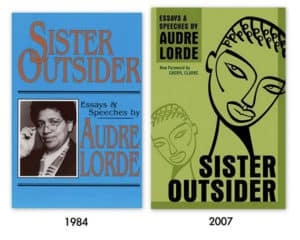Audre Lorde’s Sister Outsider first and second edition
Coming to this fellowship during a time of social unrest due to a dual pandemic, of racial injustice and international health crisis, I asked myself: How can my work address injustice in the archive?
In exploring this terrain amidst a time in which anti-racism and social justice are now in the national lexicon, I witnessed much of what was said on the topic across institutions as empathic to understanding racial justice but there was a limited focus on policy and change to implement to support those most marginalized, specifically, within the academy.
In approaching the development of a database and researching current film archives, I found many of the mainstream archives housed in university and national libraries were just starting to challenge what Audre Lorde calls the “mythical norm.” In her seminal work, Sister Outsider, Lorde’s definition of the mythical norm challenges the assumption of normality which prioritizes straight, white, middle class and maleness. The book is essential in the Black Studies tradition and provides a framework for me to challenge the mythical norm in the archives. I began by exploring digital spaces that disrupt the perceived norm and create a space honoring Black people’s lives, perspectives and experiences.
Identifying the works of Dr. Stephanie Y. Evans and their curation of Black women’s narratives provided me with a place to understand Black digital spaces that can be created as sites of rebellion and supplement already standing scholarly work. This project is helpful in thinking about the manner in which my work over the summer can be developed while honoring a digital scholarly commitment to anti-racism.
Dr. Evans and other Black digital humanists’ works I discovered allowed for me to see the utility of a digital resources while also understanding how it is situated across the social sciences.
In approaching the development of an archive of Black youth centered films I consider the history that Black children are often not afforded childhoods as we have seen with the police murders of Aiyanna Stanley Jones, Trayvon Martin and Antwon Rose II. The rationale of this ongoing work is developing a space where Black children are recognized as such and their lives, fictionalized or not, are worthy of our attention. In this space, joy can outweigh pain, fantasy can be real, and their lives, real and otherwise, can be honored.
The development of a film database that honors Black children, specifically girls, will serve as a scholarly supplement to my current research on Black girls in film as well as a stand-alone resource for teachers, filmmakers, youth and their stakeholders. I view this work as an act of anti-racism in the academy, rooted in the tradition of African American Studies which encourages us to look at history and archives and the like with a critical lens to identify social injustice and develop interventions to create just archives.
-Lisa Covington

